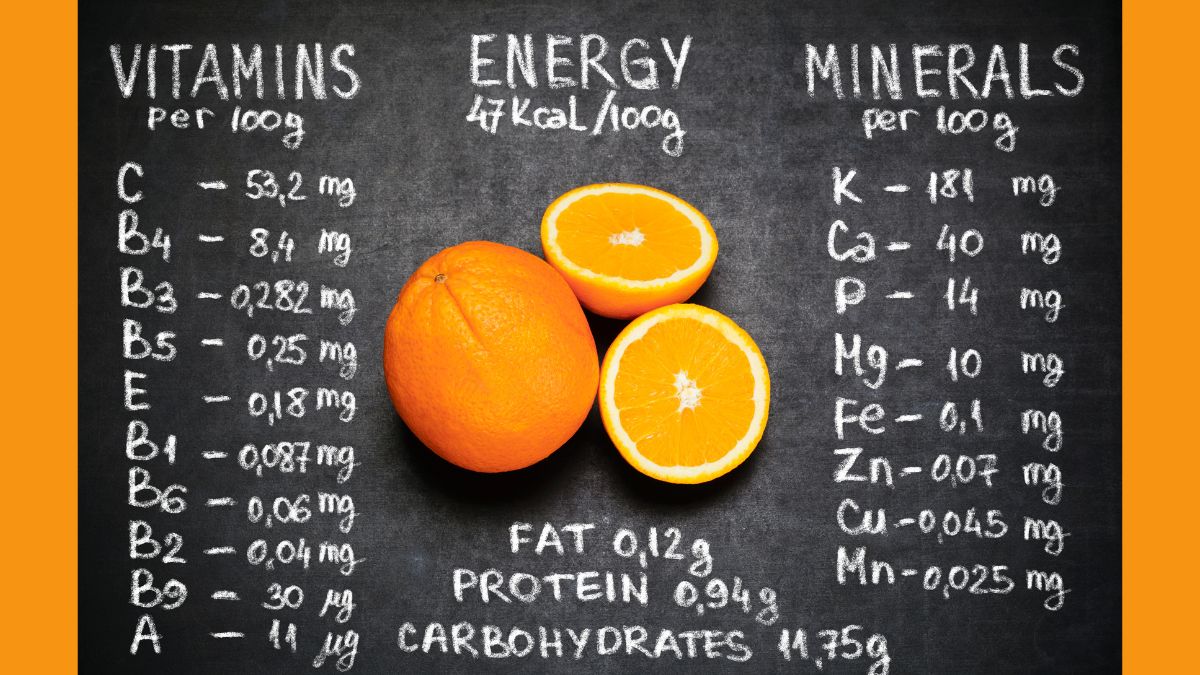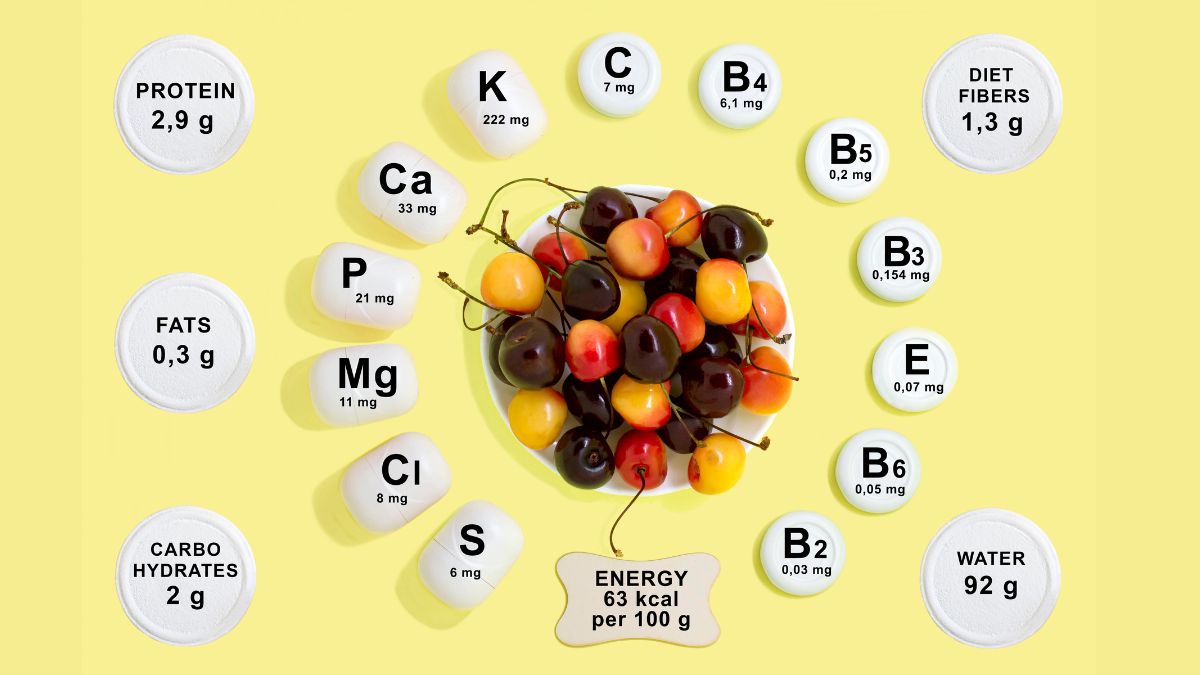- By Priyanka Munshi
- Thu, 22 Feb 2024 09:09 AM (IST)
- Source:JND
Complete List Of Vital Vitamins And Minerals: Minerals and vitamins are very important for maintaining physical wellness. Numerous biological processes, such as metabolism, immunological system operation and cell repair depend on these micronutrients. For example, vitamin C promotes collagen synthesis and immunological function, while calcium is essential for healthy bones and muscular function.
Vitamin D facilitates calcium absorption and bone strength, while iron helps carry oxygen throughout the body. Getting enough vitamins and minerals is ensured by eating a balanced diet full of fruits, vegetables, whole grains and lean proteins, according to WebMD.

Vitamins C, D, and iron promote collagen synthesis, calcium, bone strength, and oxygen transport. (Image Credit: Canva)
Moreover, people with certain deficiencies or dietary limitations may benefit from supplements. A nutrient-rich diet can help people feel better overall and ensure that their body's systems are operating at maximum efficiency. So here we have curated a lists of vitamins and minerals that are necessary for your well-being.
Types Of vitamins Their Sources, functions And Deficiencies
Vitamin A
Vitamin A aids in the formation of red blood cells, prevents infections, and improves night vision. For the health of your liver, you can eat orange vegetables, fruits, spinach, dairy, and seafood.
Vitamin B (Thiamin)
Whole grains, legumes, nuts, and pigs all contain thiamine, which is required for energy synthesis and brain cell formation. More vitamin B should be consumed, especially by women who are pregnant.
Vitamin B2 (Riboflavin)
Breakfast is not only the healthiest meal of the day, but it is also necessary to receive Vitamin B2. Breads, cereals, eggs, green vegetables, and milk are good sources of this vitamin. B2 prevents migraines and aids in cell function.
Vitamin B3 (Niacin)
The body needs specific substances for cholesterol reduction, skin protection, and energy conversion. You can add peanuts, lean meats, crimini mushrooms, and canned tuna in your daily consumption foods to get adequate amount of Vitamin B3.
Vitami B6
Leafy vegetables, fruits, legumes, fish, poultry, and lean meat are all necessary for obtaining the B6 vitamin.
Vitamin B12
To help with energy breakdown, it's a good idea to eat a healthy snack with extra vitamins, including B12.
Vitamin C
Drinking orange or grapefruit juice can help you stay hydrated. Fruits and vegetables are a good source of vitamin C, which is necessary for the growth of bones, skin, and muscles.
Vitamin D
For healthy bones, neurological function, and the defense against infections, vitamin D is crucial. It can be acquired from orange juice, eggs, milk, fish, sunshine, and vitamin D supplements.
Vitamin E
In addition to being an antioxidant and blood flow maintainer, vitamin E shields cells from harm. Sunflower seeds, almonds, olive oils, spinach, broccoli are good sources of Vitamin E. However, you can be allergic to some of these sources. Hence, you should ask a dietician before consuming these foods.
Vitamin K
Vitamin K is essential for blood clotting and strong bones. Fermented soybeans and leafy green vegtables are Vitamin K rich foods.
Types Of Minerals In Food, Their Functions And Sources
Calcium
Strong bones and teeth, the ability to move muscles depend on calcium. Eating dairy products and leafy greens can help icnreasing calcium levels in the body. However, the intake differs for each age group and gender.
Chromium
Supplements promising weight loss lack scientific backing, while vegetables like broccoli and garlic are good sources of chromium, which is a trace mineral necessary for blood sugar regulation.
Folic Acid
All pregnant women should take folic acid because it aids in the synthesis of DNA and helps avoid birth abnormalities involving the brain. Eating foods high in folic acid, such as Brussels sprouts, asparagus, and lentils, is the best.
Iodine
In addition to regulating metabolism, iodine is a thyroid hormone and high intake can cause goiter, a neck tumor.
Iron
Low iron levels can cause anemia, which impacts the synthesis of red blood cells and the transport of oxygen. Spinach, dark chocolate, oysters, beans, lentils help in maintaining iron levels.
Magnesium
Whole grains, avocado, cashews, spinach, soybeans, and almonds are good sources of magnesium. Magnesium is necessary for the synthesis of proteins, the creation of DNA, heart rate regulation, blood sugar regulation and the conversion of energy.
Potassium
Potassium, which supports renal function and maintaining blood pressure, is abundant in green leafy foods and bananas. A balanced diet that is rich in potassium and sodium is necessary.
Selenium
Selenium is an essential mineral that supports thyroid and immune system function, but too much of it can lead to brittle nails and irritation.
Also Read: BTS Members Tattoos And Their Meanings: Jimin's Moon Tattoos To Suga's Hidden 7 Tattoo
Zinc
The immune system, taste, smell, eyesight, wound healing depend on zinc. Though it is easier to absorb from animal foods, it is obtained from plant sources such as cashews, chickpeas, lentils, and sesame seeds.
Vitamins | Minerals |
| Vitamin A | Calcium |
| Vitamin B (Thiamin) | Chromium |
| Vitamin B2 (Riboflavin) | Folic Acid |
| Vitamin B3 (Niacin) | Iodine |
| Vitami B6 | Iron |
| Vitamin B12 | Magnesium |
| Vitamin C | Potassium |
| Vitamin D | Selenium |
| Vitamin E | Zinc |
| Vitamin K |
(Disclaimer: This article is for informational purposes only. It is not a substitute for professional advice, diagnosis or treatment.)

